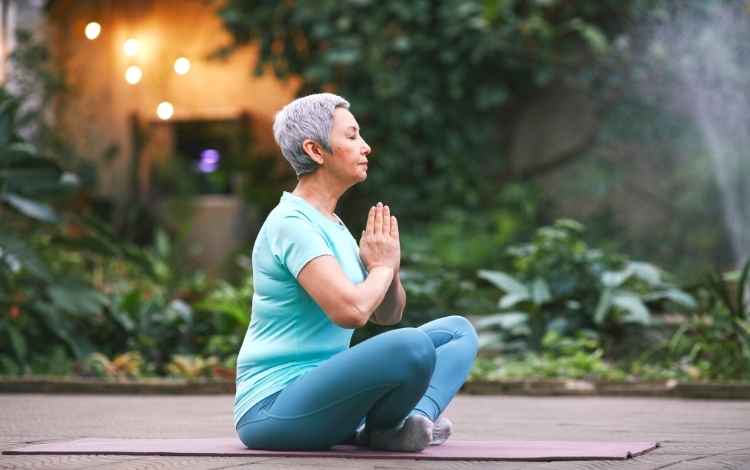
It is now well known that mindfulness meditation and other mindful exercises can have a profound impact on our mental health. But what about its effects on our physical health?
Many studies suggest that mindfulness may also play an important role in senior care. It can help improve the quality of life for senior adults.
In this blog, we will explore the evidence for the benefits of mindful exercises and meditation in senior care.
Reduces Loneliness and Social Isolation
Browse our online courses on meditation, positive thinking, overcoming procrastination, confidence, and freedom from distractions.
Senior citizens often spend most of their time alone. This can lead to a feeling of isolation and loneliness. This, in turn, can hamper their mental and physical health.
Meditation provides a simple solution to this problem. It helps senior citizens better cope with isolation. It prevents the occurrence of negative thoughts, which can hamper their health.
One study found that mindfulness meditation can help reduce loneliness and social isolation in older adults. The study, which was conducted with seniors, found that those who participated in a mindfulness program had significantly lower levels of loneliness and social isolation than those who did not participate in the program.
If you want to learn more about mindfulness meditation, we encourage you to speak with your healthcare provider. If you don’t know about a healthcare provider in your area, you can search for a nearby doctor online.
You can search online for a “doctor’s office near me” to get a list of primary care doctors in your vicinity. You can then compare the different doctors by checking their profiles, patient reviews, and other vital information. You can then book an online appointment for yourself or a loved one to get the proper guidance.
Enhances Sleep Quality
As we age, our sleep patterns often change. Older adults may have trouble falling asleep or staying asleep through the night. This can lead to fatigue, insomnia, and other problems. This is not good for the physical and mental health of the individual.
Stress, poor nutrition, aging, and chronic diseases are all causes of sleeplessness.
Meditation before bedtime unwinds your body. This helps lower stress and creates a peaceful state of mind. This can help improve sleep quality and quantity.
A study of seniors found that those who participated in a mindfulness program had significantly better sleep quality.
You can consult with a primary health physician to get more information about how to meditate, and about improvement in sleep quality and daytime impairment with meditation.
Increases Attention Span
The brain’s cognitive power decreases as we age. Thus, senior adults aren’t able to focus on a thing for a long time, i.e., they have a reduced attention span. This can lead to difficulties in:
- Remembering simple things,
- Distinguishing speech in a noisy environment,
- other issues that can impact day-to-day functioning.
But mindful exercise and meditation can help improve attention significantly. Even in those senior adults who have just started meditation programs. Several types of research have suggested that mindfulness meditation training enhances attention span.
But the specific types of attention have fluctuated among studies. Still, they all prove that mindfulness increases the attention span in older adults.
Lowers Blood Pressure
The National Institutes of Health has found that meditation may help people with high blood pressure. In their study, those with mild hypertension saw the most benefit from meditation and mindful exercise.
If you, too, want to know how meditation can help lower blood pressure, consult a general care physician as soon as possible. They will provide you with the proper guidance on using meditation and mindfulness that can help lower your blood pressure.
Boosts the Immune System
The immune system becomes weak as we age. This makes us more susceptible to diseases and other health issues. Meditation and mindful exercise can help boost the immune system.
Meditation has been known to help improve the function of the immune system. It suppresses damaging processes in the body and boosts cortisol levels. This can help treat various inflammatory conditions, such as ulcerative colitis and irritable bowel syndrome, by reducing inflammation.
A study published by the National Academy of Sciences supports this claim. It showed that those who participated in a mindfulness program had significantly higher levels of immunity than those who did not participate in the program.
Enhance Strength, Flexibility and Balance

As people age, it’s natural for them to slow down and become less active. This can lead to various physical problems, including muscle weakness, stiffness, and a loss of balance.
However, research has shown that meditation can help seniors stay strong, flexible, and balanced.
One study found that regular meditation increased upper-body strength in seniors significantly. Another study showed that meditating for a few minutes every day helped improve flexibility and balance.
Online Meditation Course: The Path to Awakening
Meditation techniques with guidance for finding inner peace, expanding consciousness, and awakening.
Meditation works by improving focus and concentration. This, in turn, helps the body to better control its muscles. Moreover, the deep breathing involved helps to improve circulation. It increases oxygen flow to the muscles. As a result, regular meditation can help seniors stay physically active and independent for longer.
Promotes Mindfulness
Finally, meditation and mindfulness exercises can help promote mindfulness.
Mindfulness is practicing deliberately and paying attention to the present moment without judgment. By focusing on their breath or simple tasks like walking or eating, seniors can help themselves to become more aware of their surroundings.
As they become more mindful, they may find that they can better engage with the world and feel more connected to others. In addition, mindfulness has been shown to improve mental clarity and focus. This can help seniors to maintain their independence as they age.
For all these reasons, meditation can be an important tool for promoting mindfulness in senior citizens.
Conclusion
There is a growing body of evidence to suggest that mindfulness meditation can have a profound impact on our physical and mental health in various ways.
If you or someone you know is interested in exploring mindfulness to improve their health, there are many resources available to get started. Also, don’t forget to consult a primary care doctor for guidance and assistance.
We hope that mindful exercise and meditation will help you enhance your quality of life!


